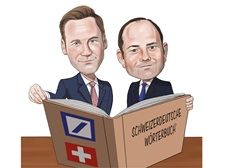Swiss Franc Bond House: Deutsche Bank
Schweizer Deutsche
Following major upheavals in the Swiss market, foreign competitors to the remaining mega banks jockeyed for position. One set up the best systems, gained the trust and respect of the market, and massively increased its market share. For this, Deutsche Bank is IFR's Swiss Franc Bond House of the Year.

There was something crystal clear from the beginning of 2024 in the Swiss franc bond market. Even if everyone knew which bank would secure the top spot in the league tables, the competition was going to be fierce.
After more than two decades of the market being contested almost continuously between the two big guns, Credit Suisse and UBS, the collapse of the former and its takeover by the latter left the arena open for other banks to make their mark.
To be sure, UBS ended the year at the top of the league tables. But the real story was the progress made by other banks in the market. In a hotly contested battle, Deutsche Bank shone the brightest.
It was outside the top three in the league tables, but its market share grew more than the ones above it.
In a very busy year, with nearly SFr75bn (US$82.1bn) of overall supply, Deutsche had a market share of 13.06% of all deals excluding Pfandbriefe, according to LSEG data. That compared with 9.28% in 2023. Its deals grew to 53 from 40.
New hires across debt capital markets, syndicate, sales and trading allowed Deutsche to set up an integrated bond franchise and beef up the business to provide a comprehensive service.
"We have undertaken the largest inorganic investment in Europe in years. Our twofold strategy of growing the Swiss franc market, utilising our global network, with a dedicated origination group, has yielded stellar results," said Mark Lewellen, co-head of EMEA capital markets.
That investment translated into several first-time and high-profile wins. Deutsche firmly established itself as a go-to house for Swiss franc benchmark transactions for domestic as well as international issuers.
"We are the foreign bank to call for deals" said Christian Spahn, head of bond syndicate in Zurich.
Deutsche secured the mandates from City of Zurich and Walliser KB, the first time a foreign bank had been invited onto domestic public sector issues.
"Getting the first foreign bank mandates was a great coup for us and has put Deutsche on the map with other Cantons and Kantonalbanks as a viable lead," said Rosario Clemente, head of Swiss franc DCM.
In the domestic sector, Deutsche also secured spots on PSP Swiss Property and Swiss Prime Site to be the first non-domestic bank on any green real estate deals.
With the domestic sector, excluding Pfandbriefe, seeing an increase in issuance of about 40%, Deutsche made great strides in this growth story by acting on three-quarters of all large cap transactions.
They included being sole global coordinator for Swisscom’s SFr1.145bn triple-tranche deal as part of the capital markets takeout of its €8bn acquisition of Vodafone Italia.
It became the first foreign bank to manage a Swiss franc bond for private equity firm, Partners Group, a SFr500m two-parter, and was involved in Swiss private bank, EFG Bank’s SFr370m dual-tranche offering. It was EFG’s first Swiss benchmark, establishing the issuer in its home market
Despite shrinking volumes by foreign issuers in 2024, those issuers remain a crucial part of the Swiss franc bond market, offering investors an opportunity to diversify.
And Deutsche was on many of the key deals, with Thermo Fisher Scientific and Volkswagen Financial Services being particularly significant, said Clemente.
The former’s SFr1.07bn triple-tranche deal in February was the first by a non-real estate US corporate to access the Swiss market since 2021 and the largest US corporate deal since Eli Lilly's in 2016.
Volkswagen Financial Services made its debut in the currency with a SFr600m dual-tranche green offering, the largest corporate green bond in the currency.
Deutsche further strengthened its position with deals for Traton and the European Bank for Reconstruction and Development, one of the few remaining tier-one supranationals never to have issued in the currency. It was also involved in the return of Slovakia to the Swiss market after a decade's absence.
To see the digital version of this report, please click here.
To purchase printed copies or a PDF of this report, please email leonie.welss@lseg.com






